Water of life?
Coconut water is the new-age isotonic miracle drink favoured by stars and celebrities. Marketed to promote health and well-being from a simple hang-over cure to curing cancer. Perhaps that is a wild claim, but there is no doubt there are plenty others which seems to give credence to the liquid.
Yet this article is not a glowing testimony for the promotion of the drink, on the contrary, it looks at the environmental and ecological impact of a mass-produced product gaining a reverent and worshipful following.
My voice is a small one and I have yet to read anything anywhere which even suggests a negative connotation of coconut water production. Such are the glowing tributes one would think the second coming had already arrived.
It's the real thing?
The big multi-nationals have not been slow in embracing the profit potential and both Coca-Cola and Pepsi have invested heavily in the drink, the latter even buying up coconut plantations to obtain the water from source. Even Madonna has invested $1.5m into Vita Coca - a company with a brand image aimed directly at the young and successful - and has hired Rihanna to be the fresh, cool, globally recognised face to promote it.
All natural fruit has health-giving benefits, and coconut water is no exception, and as with everything should be taken in moderation. Coconut water has diuretic and laxative properties, and too much could cause the drinker to unwittingly emulate Rihanna's remarkable dance choreography without the music (I have learned this to my cost, although my dance routines were more Gervais than Gaga).
Not just a nut.....
Coconut water emanates from young coconut (known as buko in the Philippines), and not to be confused with coconut milk. Unlike an orange or pineapple for example, a coconut passes through many stages of development, and each one has a purpose. Hence the term of the coconut tree as the tree of life.
Whilst there appears no evident ecological signs that plantations solely designated for young coconut production is detrimental, it is a shocking waste of a sustainable fruit with so many aspects and uses.
The shell of the young coconut is not easily biodegradable. After the water is removed there is a limited amount of edible membranous, almost translucent flesh, and in the Philippines is used as the filling for Buko Pie.
The young buko has not had a chance to grow to maturity, so copra cannot be garnered, nor coir (used as a first class fertilizer), nor can the meat be desiccated or used as main ingredients for cooking, or cosmetics or oil. Copra can be made into mats and brushes and has a host of other uses. The husk of coconuts can also be a valuable heating source, and coconut husk charcoal is a cheap fuel. None of this can be created from a young coconut.
A mature coconut can become a "macapuno", an especially prized nut of which only 10% appear in a harvest. This attracts a higher price, and most plantation growers hope for a fair share from a tree every 40 days (for an example of my typical day coconut harvesting, please click here).
Nuts in May?
Most holiday makers on a sun soaked tropical beach resort will experience a drink of young coconut straight from the nut with the obligatory straw, and its all part of the experience, but some young coconut is available in market stalls regardless of season, as far a field as New York and London - but the value of the content directly from the nut is lost.
Think about that. It is not economic to ship them by airfreight because of the weight, so many may have been on a cargo ship for six weeks or more. This is a drink that should be drank as soon as possible once it has been cut from the tree, and the reason why the manufactured packaged water should be used within 24 hours.
Even the big companies haven't discovered a method to make it last longer, and adding preservatives would diminish the benefits... but that doesn't stop them from selling it at ridiculously inflated prices.
The true cost.....
It takes 10,000 nuts for 2,000 litres of coconut water. On average it will need five nuts per litre, and much may be lost in the production and packaging process. That’s a lot of wastage. But it’s still a huge profit for the companies who have invested in the plant and machinery, or the middle men and marketers.
The big question is how are the small independent growers fairing, and are they paid a decent share?
Furthermore, none of the big three companies appear to endorse their product as fair trade or organic.
Many commodities like tea, coffee and orange juice have fair-trade symbols on them, but I don't see any on coconut water.
In the UK 1ltr of coconut water is retailing at the equivalent of $4.85. This equates to $1 per nut. In the Philippines 40% of the population struggle to live on that every day.
I can sell a young coconut, straight from the tree, for 5 pesos ($0.11c), but if it was juiced, packaged, transported and retailed in the UK it would have been marked up to a massive 1100%.
Ignorance and impotence
I suspect that many small producers are being paid much less by volume, but leveraged and influenced by the big boys. Just like supermarkets behave when dealing with farmers and small-holders regardless of crop.
Is it any wonder that plantation after plantation from South-east Asia to South America are growing young coconuts on an industrial scale and only for water?
Indigenous people always knew the benefits of coconut water, but drank it sustainably and not to impact on the agri-management of a tree. A tree which lives for 100 years, and barring natural disasters like typhoons, serves a family and community. Nuts are also taken to germinate to ensure continuity. It takes seven years just to get them going.
Coconut trees are crucial to the flora and fawna of a fragile eco-system. The desire of western consumers and the ever-increasing search for profit by big business may have a very negative impact in years to come. Rainforests are disappearing before our very eyes due to logging and land required for cattle grazing. Now coconut plantations are being attacked and violated. This is a high price to pay for a lifestyle drink.
How does this effect local farmers? How does it effect local communities? How does the drive to produce coconut water impact on people dependent on coconuts for bi-products and other derivatives to sell in the market place?
Anyway, next time you have a sip of the nectar, think about the nut who grew the nut. One of them might have been me.
Fortunately that is unlikely. I value my nuts too much to contemplate premature castration!
Latest News.....
Sold on Celebrity....
The Yankees star Alex Rodriquez is a new face of Vita Coco, even though he's reported to be a long-time invester of its biggest rival Zico. His ex girlfriend - Madonna, and his manager Guy Oseary are both investors in the brand. Coincidence?
"The stuff really works" he says. Zico has been surprised by the news. But both brands are looking for $100m this year, and each have their own army of A-list celebrities to promote the stuff.
Rodriqueuz has said that Zico are using concentrate, and he prefers the fresh and natural product offered by Vita Coco.
Concentrate? In other words bog-standard water must be added to it. But does it matter? The current army of celebs are keen to jump on the bandwagon because they know that their endorsement will sell the product to their worshipful followers and their investment will make a handsome killing.
This is a story worth following...watch this space!
September 2011 - A new development
Philippines President Binigno Aquino III was in the US in September and during the course of his visit he received a surprise four-year investment pledge for his country's coconut industry.
The deal, worth $15million, was proposed by a string of American executives who queued up to visit him at his hotel. Guess who some of these were? Pepsi and Vita Coco to name just two.
Both companies informed him about the huge global market for coconut water and touted the "medicinal values" for the health conscious consumer.
His Communications Secretary Ricky Carandang reported that the President was in "good spirits" upon hearing this news.
"These companies want to source the demand for coconut water from the Philippines, so this is a big opportunity for our coconut industry and for our farmers" Mr Carandang said.
PepsiCo are particularly keen to expand its coconut harvesting operation. But part of the deal is that they will also plant more trees. Vita Coco chief Michal Kirben says "there's a lot of room to bring rebirth to the industry in general."
But let's analyse this for what its worth. The "proposed" investment is $3.75m a year, and if most of it comes from just two of the big players, then that is less than $2m each, possibly much less when other groups are involved such as Fiesta Coco Equity (a local affiliate of Vita Coco) who also knocked on Aquino's door.
Now we are talking - about $1m per corporation. You don't need to be a financial wizard to figure that out. Quite how these paltry sums are expected to revive the Philippines' coconut industry is a mystery. Madonna alone invested $2m in Vita Coco - and that was money into a company, not a country.
$15m doesn't sound so attractive now does it? These multi-nationals are not renowned for their philanthropy or desire to improve the world. For sure they market their drinks as a benefit to mankind, but they principally benefit their shareholders, who will not be the mugs who harvest their products from source at 1100% less than the retail value. That is indeed the true price of coconut water for the humble worker.
It's akin to medieval feudalism in the modern age. Supposing that more and more coconut plantations exist purely for the production of coconut water? They are harvested young and never reach maturity, they will not be able to produce the many bi-products associated with the coconut, and the prices of coir and copra will increase. This will have a significant detrimental economic impact in many areas.
One could argue that the planting of more trees will be good for the environment and create jobs. But it is a false economy, because there is no long-term sustainability, and creates a short term business opportunity. It is based purely on a fad.
I'm not talking about key commodities like coffee, tea, cocoa, bananas or pineapples for example. These and many other products grow and develop with a finite end. The coconut is different. The Coconut tree is unique because of its versatility and its specific various stages. It's not called the "tree of life" for nothing.
Time and again I impress that there needs to be a sustainable and fair trade policy to the production of coconut water; that at least half a plantation must be allowed to fulfil a purpose naturally. I do not see this foresight from the multi-national companies - I only see exploitation.
Invariably they invest in infrastructure and create employment, but they can very easily pack their bags and move on, when either they find better opportunities, or when the markets fail. They have no loyalty other than to themselves.
If Pepsi and Vita Coco are prepared to invest $15m how much do you think they will make? You can bet most Filipinos will not see any of it.
If the Philippines government wish to revamp and restore their coconut industry then there are other ways to do it. Coconut water is not the solution.
$15m over four years from a handful of US corporations is pathetic and insulting. If the Philippines can't find that money themselves, and dedicate a desire to lift their industry by its bootstraps and do it with pride - an industry incorporating all aspects of coconut production - and with drive and determination to make them a world leader in the commodity - then they are sorely incompetent.
President Aquino should have sent the suits from Pepsi and Vita Coco packing. He should have said “I enjoyed the joke, but quite frankly I have a country to run. Thanks for the offer - but no thanks!”
A Drink Down Under.....
Natural packaging
On the store shelves in Australia are young coconuts. Not in a carton, but natural. Here the buko has been semi-husked. The green skin has been removed, but the shell is intact. Within the shell is the sealed coconut water. More than that, it will also have the delicate flesh inside.
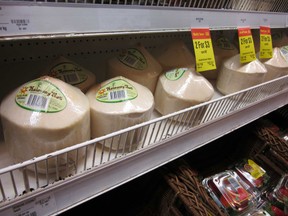
This is not everyones typical image of a coconut, but this is the young buko. These coconuts come from Thailand, and are as close as one can get to it's most natural state without picking it directly from the tree.
They retail much less than the commercially packaged one litre cartons, but they are clearly not very portable. They can't fit inside the fridge door for example.
But with a simple incision in the top, the juice can be extracted, and they are very easy to open to get at the flesh within. The flesh of the young coconut is a delicacy - and cannot be experienced by the mass marketed coconut water espoused by the big producers - something which they fail to highlight on their packaging.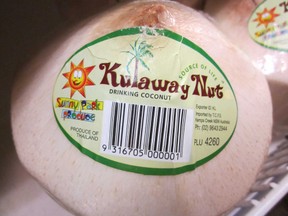
This is a much more sustainable method of delivery. As they are shipped from Thailand so their carbon footprint is smaller.
They have not been through a mechanised plant process. But let's face it - they don't have the kudos of the big brand image with the associated celebrity. Nevertheless, they will be fresher and tastier.
What's important here is that it is a simple healthy product without any complicated technology to produce.
They are not all singing and dancing. They are just nuts. Whether the growers receive their just rewards or not - this is clearly the most environmentally friendly and natural way to drink the water outside of the tropics.
Meanwhile...all together now.........
I would only buy Coconut Water provided it was produced with fair trade and was sustainable
You might also like
Think Positive. Think WoodTo be 'green' today is something more than an attitude. It is an urgent need....
The Reforestation of SkiddawBritain's project of renewing the Atlantic rain forest is taking a further st...
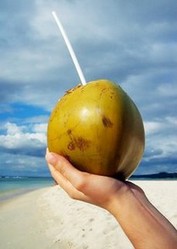



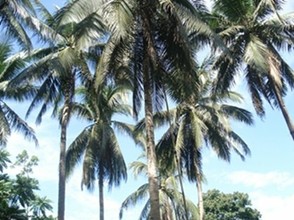
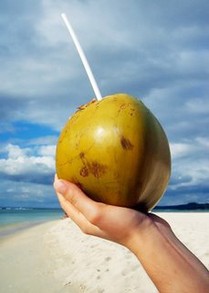


 Nancy Wakeon 06/21/2011
Nancy Wakeon 06/21/2011


Please support my campaign for fair trade and sustainable coconut water production
Hello. I'm a French journalist. And I want to do a report about coconut water business. I'm very interested by your article. Could you please give me your email at this adress: [email protected]. I would like to ask you some questions about that.
Thank you very much.
Best regards
wicked article once coke and pepsi get there hands on it they will greed it for their profits while the farmers and government get the pat on the bck. if the farmers government and sellers can all male a bit and the buyer also then thats the way forward. plantations can be for water and the rest to be able to mature. but hey damm good artical. i shouldve follow my gut feeling 5 years ago and invested instead i buy and drink it. great info mate
Great article! I enjoyed a lot reading it! Thumbs up!
Coconut water is so refreshing. The trunk, leaves even Coconut's roots have many uses too.
They destroy the entire point of coconut water when they open them up, tin them, sugar them, and preserve them. It changes the Ph balance.
I grew up on a farm in India where we grew coconuts - so fond memories. Recently I have reacquainted myself with the packaged coconut water as a sport-drink during exercise. Love the taste and I think it does help recover from dehydration. Thanks for dedicating the page to it.
I learned so much about coconut water from your article - thank you!
What an interesting article. I am a coconut oil fan and use it for lots of things, from cooking to skin care. I agree with you that the potential for exploitation and wastefulness is huge.
I used to drink natural coconut water - or milk as it was called by some - in Belize. I also used freshly squeezed Coconut Oil for all my cooking. Super stuff. A good article. I love it. Ciao, and TYVM
wow wish we had young coconuts like you guys have in Australia!! I havent seen vita cola or ever drank cocnut water/but will be looking for it now!
as for fair trade, as with coffee and handmade items, given a choice it is always better to support fair trade!